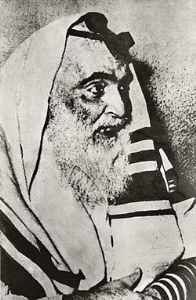A Short Tribute
Hacham Haim Houri was born during the month of Tishrei 5645 (1885) to Mevirka and Abraham Zaqen, on the island of Djerba. He was their only child.
While a young man, he studied with Hacham Moshe Zaqen Mazouz and Hacham Fardji Alush, and also worked at a printing press.
In 1903, at the age of 18, he was ordained to the rabbinate and appointed cantor and teacher for the Gabès community, in the south of Tunisia. He eventually returned to Djerba, where he officiated as dayan and rabbi. In 1926, when the community's rabbi, Hacham Yitzhak Bokhobza, left Gabès, he was called back to officiate in his stead.
Hacham Haim Houri married twice. He and his first wife had two daughters; seven sons and four daughters were born to him and his second wife, some of whom died very young.
Hacham Haim Houri founded the Torah V'Haim yeshiva as well as several charitable institutions. He was known as an outstanding preacher, and took care of the community's poor people. He was involved in education, had books printed and distributed, and established a public fund to finance publishing. He would try and be the first person to give his donation to the community, so as to serve as an example for the general public.
During the Second World War, he was the Gabès community's leader under the Nazi regime.
Hacham Haim Houri was known for his deep love for the Land of Israel and its sages and rabbinic emissaries. He was an ardent supporter of immigration to Israel, and his home served as a transit station for the illegal immigrants from Tripoli on their way to the Holy Land. Hacham Haim Houri was a member of the Ateret Zion association that promoted study of the Hebrew language and of agriculture towards immigration to the Land of Israel.
In 1954, at the age of 70, he was able to immigrate to Israel. He lived in Bnei Brak for a short period and then settled in Beer Sheva.
Hacham Haim Houri translated many books, including Tzipporen Shamir, by Maran HaHID"A, and authored three works: Derech Haim – on Torah and Talmud, Hessed V'Emet – containing sermons and explanations commemorating various sages, and Nifla'ot Gedolot.
Hacham Haim Houri passed away on 25 Iyar, 5717 (1957), two years after immigrating to Israel, and was buried in Beer Sheva.
